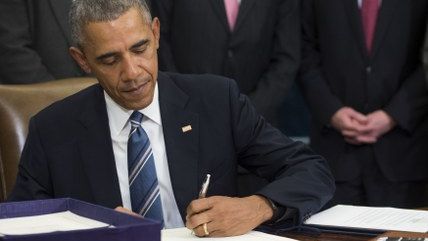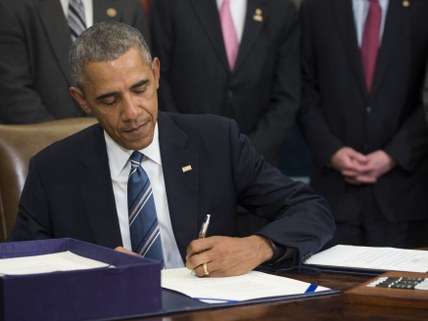Judge: Obama Administration's New Overtime Rules an Overreach
Want to change the rules? Go ask Congress.


If you want to change federal overtime requirements, then go to Congress and change the law. That's what a federal judge said (give or take 20 pages of text) Tuesday evening when granting a temporary injunction to halt the implementation of the Obama administration and the Department of Labor's rule drastically increasing the number of people who would qualify for overtime pay under federal law.
The background: President Barack Obama's administration decided earlier in the year it would executively update the policies of employees covered by the Fair Labor Standards Act. This law sets thresholds for employees who work salaried jobs and are exempt from overtime laws. One of the thresholds is salary; the Department of Labor decided it would double the minimum salary in order to drastically increase the number of workers who qualified for overtime. They changed the minimum threshold from $23,360 a year to $47,476 a year, which would have affected more than 4 million workers.
Not so fast, said Judge Amos Mazzant, of the Eastern District of Texas. In response to a challenge and a request for an injunction from 21 states, he ruled against the administration, meaning the law will not take effect on Dec. 1 as planned.
As Mazzant explained in his ruling, while the Department of Labor does have leeway to make adjustments and updates to the rules, it can't do so in such a way that goes against the law's intent. The law doesn't use pay levels to determine who is exempt from overtime, though there are minimum pay levels written in the law. It actually uses job duties to determine who qualifies for overtime. The new rule completely ignores the emphasis on job duties and therefore conflicts with Congress' intent with the law. Mazzant notes:
[N]othing in the EAP exemption indicates that Congress intended the Department to define and delimit with respect to a minimum salary level. Thus, the Department's delegation is limited by the plain meaning of the statute and Congress's intent. Directly in conflict with Congress's intent, the Final Rule states that "[w]hite collar employees subject to the salary level test earning less than $913 per week will not qualify for the EAP exemption, and therefore will be eligible for overtime, irrespective of their job duties and responsibilities." With the Final Rule, the Department exceeds its delegated authority and ignores Congress's intent by raising the minimum salary level such that it supplants the duties test. Consequently, the Final Rule does not meet Chevron step one and is unlawful. The Department's role is to carry out Congress's intent. If Congress intended the salary requirement to supplant the duties test, then Congress, and not the Department, should make that change.
He noted that the rule essentially creates an exemption determination based on salary alone, thereby ignoring a chunk of the law.
Mazzant is not ruling that it is bad or wrong to want to alter the salary threshold required to qualify for overtime (though it will most certainly have very bad consequences for those many workers, who will see hours cut back and opportunities for advancement dry up as these types of positions are eliminated). Instead, the judge merely ruled that the administration overstepped its authority. It doesn't have the power to make this change on its own.
That the judge's decision is entirely about the administration not following proper procedures makes the upset responses like this one from Politico a bit puzzling:
Liberal groups were swift to denounce Mazzant's decision. "This is an extreme and unsupportable decision and is a clear overreach by the court," said Ross Eisenbrey, vice president of the left-leaning Economic Policy Institute, who helped the Labor Department develop the regulation. Eisenbrey called it "a disappointment to millions of workers who are forced to work long hours with no extra compensation" and "a blow to those Americans who care deeply about raising wages and lessening inequality."
If the incoming Donald Trump administration decided it would change the rules to lower the salary level necessary to be exempt from overtime, I doubt Eisenbrey would think it would be "overreach" for the court to tell Trump he couldn't rewrite the law in such a fashion. That's perhaps something worth thinking about, because if Mazzant allowed Obama to executively change the rules this way, then there's no reason a President Trump couldn't change it in the other direction.
You can download and read the ruling for yourself here.


Show Comments (68)